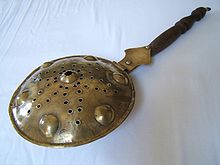


A bed warmer or warming pan was a common household item in countries with cold winters, especially in Europe. It consisted of a metal container, usually fitted with a handle and shaped somewhat like a modern frying pan, with a solid or finely perforated lid. The pan would be filled with embers and placed under the covers of a bed, to warm it up or dry it out before use.
Besides the risk of fire, it was recognized that the fumes from the embers were noxious. A doctor advised his readers in a c.1790 publication to avoid bed warmers, or, if needed, replace the embers with hot sand.
An alternative to the bed warmer was the "bed wagon" (moine in French and monaco in Italian, both meaning "monk"). It consisted of a large wooden frame enclosing a bucket of embers, possibly with an iron tray and an iron roof-plate to protect the bed covers from direct heat.
Bed warmers were commonly used from the mid-17th to early-20th century. They fell out of fashion with the rise of other methods of warming homes and beds.
Pottery filled with hot water also was used. With the advent of rubber, the hot water bottle became dominant. In the early 20th century, electric blankets began to replace the bed warmer.
An alternative kind of bedwarmer in the mid-20th Century in the UK was a 36cm/14inch pressed steel "flying saucer" or lozenge-shaped device made by Belling (established 1912), powered using an internal 40W incandescent light bulb as a heat source.
See also
- Hot water bottle - a bottle filled with hot water and sealed with a stopper, used to provide warmth, typically while in bed.
- Electric blanket - a blanket that contains integrated electrical heating.
- Warming Pan Baby - a nickname for the son of James VII and II, supposedly snuck into the queen's bedchamber in a warming pan
References
- ^ Cora Millet-Robinet (1853): Domestic Economy. "A copper warming pan is indispensable to a household. Take care to have a big enough quantity of embers, above all some red cinders, when you want to heat a bed. Get it smouldering well before you use it, otherwise the fire will soon go out and the bed will not warm up. You must move the warming pan constantly to avoid scorching the sheets. A bed-wagon (moine), well-known and inexpensive, is a suitable alternative.". Cited by "Bed warmers", Old & Interesting website. Accessed on 2019-05-10.
- Thomas Rowlandson (1794): The Comforts of High Living. Satyrical cartoon print. Reproduced in Calinda Shely (2016): The Distemper of a Gentleman: Grotesque visual and literary depictions of gout in Great Britain, 1744-1826, page 149. Ph. D. thesis, University of New Mexico.
- Dr. James Makittrick Adair (c. 1790): Essays on Fashionable Diseases: the dangerous effects of hot and crowded rooms. Cited by "Bed warmers", Old & Interesting website. Accessed on 2019-05-10.
- Gertrude Jekyll (1904): Old West Surrey. Cited by "Bed warmers", Old & Interesting website. Accessed on 2019-05-10.
- (1937): "Resistance wires heat electric blanket" Popular Science, volume 130, issue 2 (Feb), page 62
- "Historic cooker manufacturer behind Belling ovens to shed 300 jobs".
- "Belling Bedwarmer, 1960s, Original | Object Lessons - Houses & Homes: 20th Century - Present". www.objectlessons.org. Archived from the original on 2015-01-09.
| Bedding | |
|---|---|
| Adult beds (bed sizes) | |
| Infant beds | |
| Bed components | |
| Mattresses | |
| Bed bases | |
| Blankets | |
| Pillows | |
| Related items | |